hankyoreh
Links to other country sites 다른 나라 사이트 링크
[In-depth report] Just why has Pope Francis been received so warmly in South Korea?
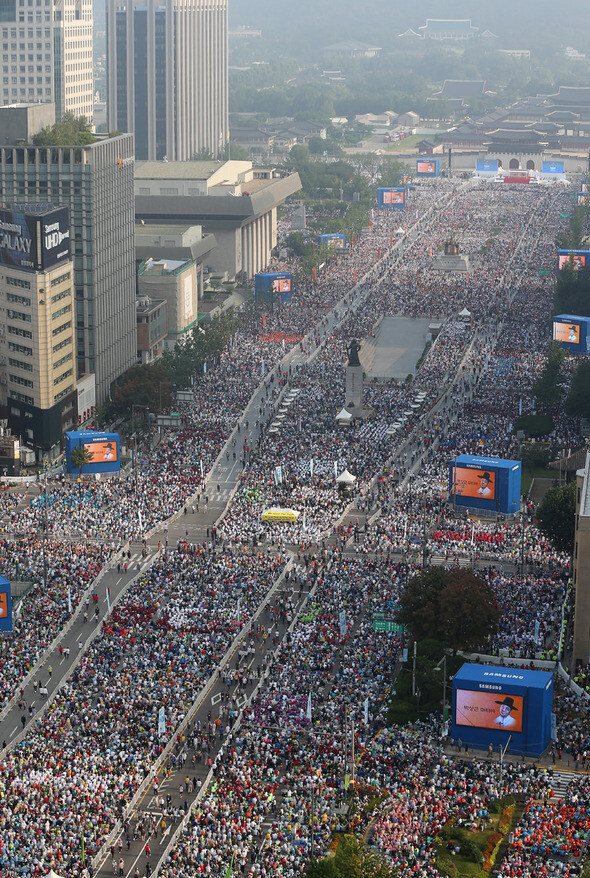
By Song Ho-kyun, Choi Woo-ri and Lee Jae-uk, staff reporters
“No matter how hard, unfair, and difficult things are, there’s not a single person you can trust and rely upon. Perhaps that’s why people are so excited about the pope.”
Lee Gil-won, 54, was speaking to a Hankyoreh reporter at the beatification ceremony for Paul Yun Ji-chung and 123 other martyrs, which was held at Gwanghwamun Square, Seoul, on Aug. 16. A yellow ribbon, commemorating those who were lost in the Sewol tragedy, was pinned to his chest.
Although four months have already passed since the Sewol tragedy, the pope has not ignored the voices of the people who have nowhere to turn, including the families of those who died in the tragedy, who continue their struggle on the streets. Residents of Miryang and Gangjeong Village in Jeju Island, relatives of the victims of the 2009 Yongsan Tragedy, a violent clash at a redeveloped building, and dismissed Ssangyong Motor workers were all given official invitations to the mass at Myeongdong Cathedral in Seoul on Aug. 18.
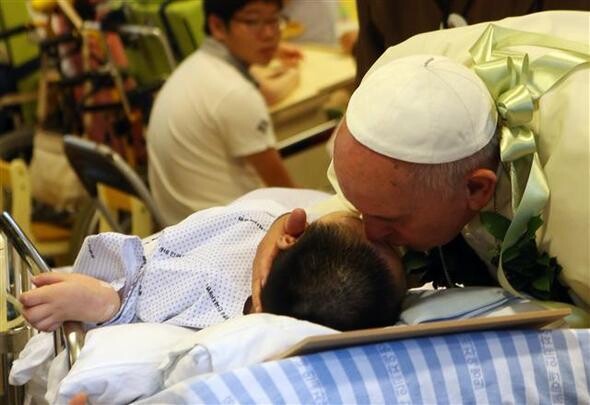
Kim Dan-a, 27, identifies herself as an atheist, but she said that the leadership vacuum may be the reason for the Pope Francis phenomenon. Kim says that she was overwhelmed when she saw the pope holding the hand of Kim Yeong-oh, who is on the 34th day of his hunger strike, before the beatification ceremony began.
Kim is better known as the father of Yu-min, a student at Danwon High School in Ansan, Gyeonggi Province who perished in the accident.
“The pope may not be able to solve the problems of South Korean society, but he at least seems like a leader who is able to listen to what people have to say,” she said.
Park Min-jin, 26, said that she was baptized in January. When she saw the pope comforting the Sewol families, she felt like she was the one being comforted.
Han Nam-hee, 57, delayed an overseas trip so she could see the pope. “I wish other leaders would learn from the pope how to minister to the weak and the humble,” she said.
“It is shameful to look back on these problems that we were unable to solve ourselves through the eyes of the pope. It is not too late for politicians to work together to take care of the poor and the oppressed,” said Song Seon-tae, 58, permanent director of the May 18 Memorial Foundation.
“The ‘healing’ craze in Korea has focused on the individual. However, the actions of the pope have made me feel that healing could take place not only for individuals but for society as a whole. The fact is that the wounds from various social conflicts are not being healed, and there is a push to sweep the Sewol problem under the rug because it is hurting business prospects.
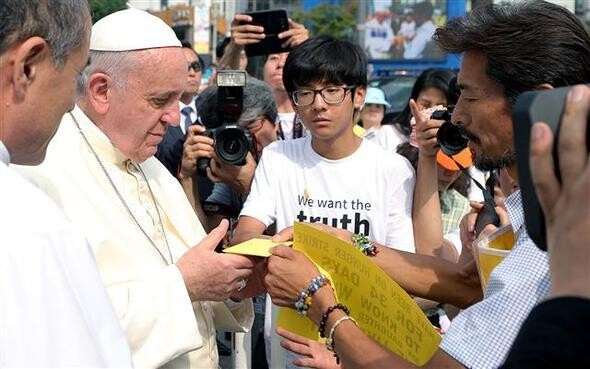
Under these circumstances, I think the pope’s actions have served as an opportunity for us to reflect on our own actions,” Jang Jae-hwan, 49, a resident of Seoul’s Guro district.
“Korean society is obsessed with materialism, so the teaching of the pope that everyone is important regardless of their position or status is bringing this issue into focus,” said Lee Won-young, 42, who attended the beatification ceremony with his wife and two sons.
“I think that the most valuable thing the pope has done is give our young people a message of hope,” said Kim Yong-bo, 62.
Jeong Ho-jung, 45, is a Won Buddhist, but he came all the way up from Iksan, North Jeolla Province, to attend the beatification ceremony. “Religion is not immune to the influence of a society that only prioritizes material success and growth. By emphasizing original human values, I believe that the pope is modeling what it means to be a genuine religious person. During his remaining time in Korea, I hope that he continues to speak on behalf of the needy and the weak and that he sends a message that can heal those who are hurting,” Jeong said.
The pope’s kind, humble leadership - forgoing an expensive car and luxurious accommodations - is also moving because it is unexpected.
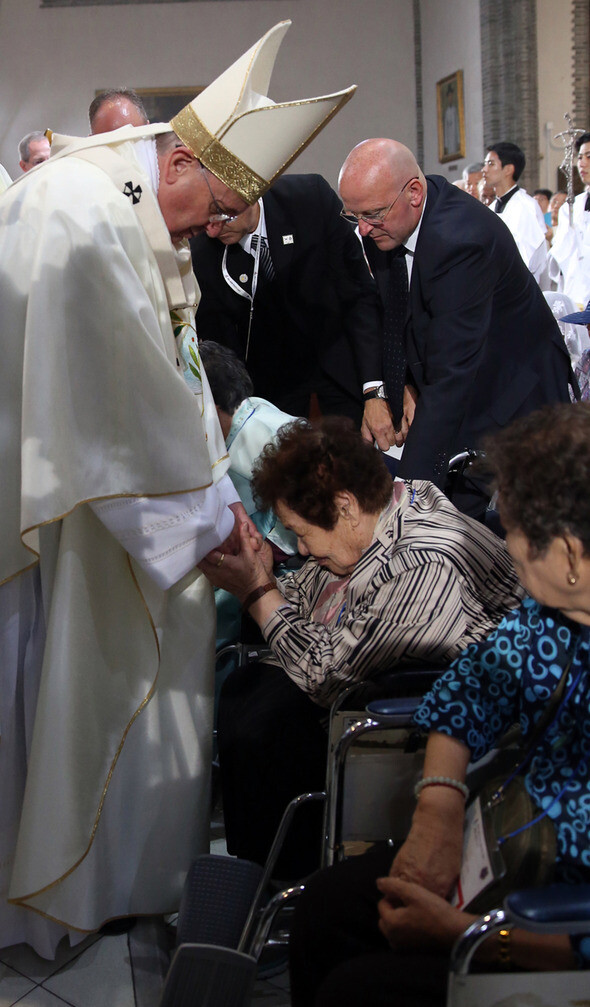
“The pope is in a high position, so I was surprised and touched to see how easily and naturally he relates to ordinary people,” said Lee Jae-yun, 16, a first-year student at Sanbon High School in Gyeonggi Province.
“I wish that we would also learn something from how the pope stops his car to bless each child he sees. I wish we would learn to embrace those who are hurting, and in particular those who are weak and vulnerable,” said Kim In-sun, 54.
“I saw the pope speak when he visited Kkottongnae [a welfare facility for the elderly and disabled in South Chungcheong Province]. He stood for about 50 minutes without sitting down. This is not something that he could have done if he were not sincere,” said Park Ji-eun, 28.
“I was moved to see the pope treating the homeless, the disabled, and everyone who is suffering equally, as humans,” said Eum Young-kyung, 33, a painter who works in Jeongju, North Chungcheong Province. “Unlike the authoritative attitude of the powerful, the pope’s informal and simple attitude, and the way that he lays down everything he has, constitute the true image of a clergyman.”
Though the pope is the global leader of the Catholic Church, he has earned widespread admiration for his magnanimous emphasis on people rather than on specific doctrine.
“Buddhists are also talking about the pope’s message that we should regard all life as precious and resist the materialism of capitalism,” said Choi Young-hwa, 45, a Buddhist.
“I was jealous about the fact that none of our pastors are like the pope,” said Shin Dong-min, 22, a university student and a Protestant.
“Instead of telling people to go to church or believe in Jesus, the pope is telling us to pay respect to the lowly. In the end, it occurs to me that that may have been the message that Jesus meant to deliver to humanity. The most important role of religion is not to multiply the number of believers but rather to heal the hurting around us and to bring light to the darkness. Now, it’s the turn of Korean society to respond to this message,” said Son Seong-ik, 41, who met a Hankyoreh reporter at the beatification ceremony.
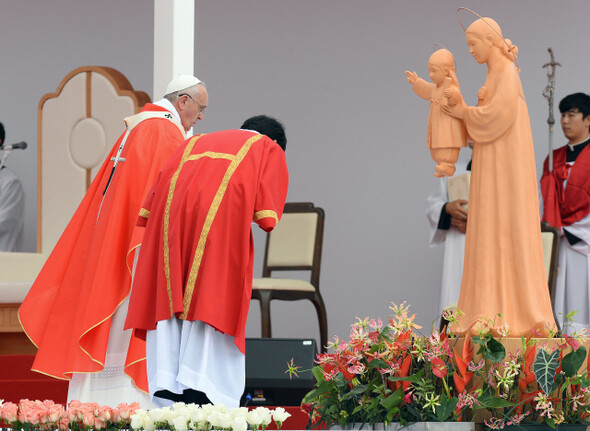
Please direct questions or comments to [english@hani.co.kr]
세월호 십자가 순례 마친 웅기 아빠 “약속되지 않은 이별에서 오는 고통이…”

Editorial・opinion
![[Column] Park Geun-hye déjà vu in Yoon Suk-yeol [Column] Park Geun-hye déjà vu in Yoon Suk-yeol](https://flexible.img.hani.co.kr/flexible/normal/500/300/imgdb/original/2024/0424/651713945113788.jpg) [Column] Park Geun-hye déjà vu in Yoon Suk-yeol
[Column] Park Geun-hye déjà vu in Yoon Suk-yeol![[Editorial] New weight of N. Korea’s nuclear threats makes dialogue all the more urgent [Editorial] New weight of N. Korea’s nuclear threats makes dialogue all the more urgent](https://flexible.img.hani.co.kr/flexible/normal/500/300/imgdb/original/2024/0424/7317139454662664.jpg) [Editorial] New weight of N. Korea’s nuclear threats makes dialogue all the more urgent
[Editorial] New weight of N. Korea’s nuclear threats makes dialogue all the more urgent- [Guest essay] The real reason Korea’s new right wants to dub Rhee a founding father
- [Column] ‘Choson’: Is it time we start referring to N. Korea in its own terms?
- [Editorial] Japan’s rewriting of history with Korea has gone too far
- [Column] The president’s questionable capacity for dialogue
- [Column] Are chaebol firms just pizza pies for families to divvy up as they please?
- [Column] Has Korea, too, crossed the Rubicon on China?
- [Correspondent’s column] In Japan’s alliance with US, echoes of its past alliances with UK
- [Editorial] Does Yoon think the Korean public is wrong?
Most viewed articles
- 1‘We must say no’: Seoul defense chief on Korean, USFK involvement in hypothetical Taiwan crisis
- 2N. Korean delegation’s trip to Iran shows how Pyongyang is leveraging ties with Moscow
- 346% of cases of violence against women in Korea perpetrated by intimate partner, study finds
- 4[Column] Park Geun-hye déjà vu in Yoon Suk-yeol
- 5‘Weddingflation’ breaks the bank for Korean couples-to-be
- 6Will NewJeans end up collateral damage in internal feud at K-pop juggernaut Hybe?
- 7Amnesty notes ‘erosion’ of freedom of expression in Korea in annual human rights report
- 8[Interview] Dear Korean men, It’s OK to admit you’re not always strong
- 9Korean government’s compromise plan for medical reform swiftly rejected by doctors
- 10[Editorial] Japan’s rewriting of history with Korea has gone too far